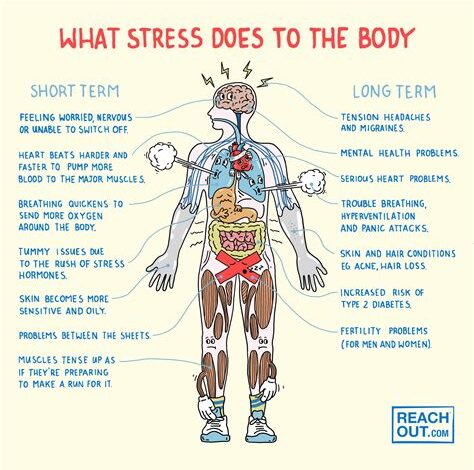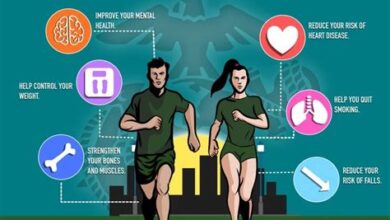The Impact of Stress on Physical Health and How to Manage It

Learn how chronic stress impacts physical health, and effective strategies for managing it through exercise, mindfulness, and relaxation techniques. Improve your well-being today!Stress is a common experience in today’s fast-paced world, and its impact on physical health cannot be overlooked. From headaches and muscle tension to more serious health issues like heart disease and diabetes, chronic stress can take a toll on our bodies in various ways. In this blog post, we will explore the relationship between stress and physical health, and the negative effects that chronic stress can have on the body. We will also delve into effective strategies for managing stress, including the role of exercise in reducing stress and improving physical health, as well as the implementation of mindfulness and relaxation techniques. By understanding the impact of stress on our physical well-being and learning how to effectively manage it, we can take proactive steps towards leading healthier, more balanced lives.
Understanding the relationship between stress and physical health
Stress has a profound impact on our physical health, and the two are intricately connected. When we experience stress, our bodies respond by releasing hormones like adrenaline and cortisol, which can contribute to a range of physical ailments. Chronic stress has been linked to a weakened immune system, increased blood pressure, and even a higher risk of heart disease. It can also exacerbate existing health conditions such as diabetes and asthma, making it clear that stress is not just a mental burden, but also a physical one.
Learning to recognize the signs of stress and its effects on the body is crucial for managing its impact on our overall health. Symptoms of stress can manifest in various ways, including headaches, muscle tension, and digestive issues. By paying attention to these physical signals, individuals can take steps to mitigate the impact of stress on their bodies. It’s important to understand that chronic stress can be detrimental to our health in the long term, and it’s essential to address it before it leads to more serious health problems.
Implementing *effective strategies* for managing stress is key to protecting our physical well-being. This may involve practicing relaxation techniques such as mindfulness and deep breathing exercises, as well as engaging in regular physical activity. Exercise has been shown to not only reduce levels of stress hormones in the body, but also improve cardiovascular health and immune function. By taking a proactive approach to managing stress, individuals can safeguard their physical health and reduce the risk of developing stress-related illnesses.
The negative effects of chronic stress on the body
The negative effects of chronic stress on the body
Chronic stress can have a profound impact on the body, leading to a wide range of negative effects on physical health. When the body is under constant stress, it can lead to an increase in cortisol levels, which can contribute to weight gain, high blood pressure, and a weakened immune system. This can increase the risk of developing chronic conditions such as heart disease, diabetes, and obesity. Furthermore, chronic stress can also impact the digestive system, leading to issues such as irritable bowel syndrome and acid reflux.
In addition to physical health issues, chronic stress can also have a significant impact on mental health. It can contribute to anxiety, depression, and mood swings, as well as impairing cognitive function and decision-making abilities. These mental health issues can further exacerbate the negative effects on physical health, creating a cycle of stress and deteriorating overall well-being.
Managing chronic stress is essential in order to mitigate these negative effects on the body. Engaging in regular physical activity, such as exercise and yoga, can help to reduce stress levels and improve physical health. Additionally, implementing mindfulness and relaxation techniques, such as meditation and deep breathing exercises, can help to alleviate stress and promote a sense of calm and well-being. It’s also important to establish healthy boundaries and prioritize self-care, as well as seeking support from friends, family, or mental health professionals when needed.
Effective strategies for managing stress
Stress is a common part of life, but it can have negative effects on both our mental and physical health if not managed properly. Luckily, there are several effective strategies for managing stress that can help us maintain a healthy balance in our daily lives.
One of the most important strategies for managing stress is to practice self-care. This can include activities such as regular exercise, getting enough sleep, and eating a healthy diet. Taking care of our physical bodies can have a direct impact on our ability to handle stressful situations.
Another effective strategy for managing stress is seeking support from others. Whether it’s talking to a friend, family member, or mental health professional, sharing our feelings and experiences can provide valuable perspective and help us feel less alone in our struggles.
The role of exercise in reducing stress and improving physical health
The Impact of Stress on Physical Health and How to Manage It
Exercise plays a crucial role in reducing stress and improving physical health. When we exercise, our body releases endorphins, which are chemicals that act as natural painkillers and also improve our mood. These endorphins help to reduce stress and anxiety, making us feel more relaxed and happy. In addition, regular physical activity can improve our physical health by reducing the risk of chronic diseases such as heart disease, diabetes, and obesity. By incorporating exercise into our daily routine, we can effectively manage stress and improve our overall well-being.
Moreover, exercise has been shown to improve sleep quality, which is essential for managing stress. When we exercise, our body temperature rises, and after the cooling period, it helps to promote a feeling of relaxation and improve sleep. Adequate sleep is crucial for reducing stress levels as it allows our body and mind to rest and recover. By engaging in regular physical activity, we can enhance the quality of our sleep, which in turn can positively impact our stress levels and overall physical health.
Furthermore, exercise promotes a sense of accomplishment and self-confidence. When we set fitness goals and achieve them through regular exercise, it boosts our self-esteem and confidence. This sense of achievement can help to reduce stress and improve our mental well-being. Additionally, engaging in physical activities such as team sports or group fitness classes can provide a social outlet, allowing us to connect with others and reduce feelings of isolation or loneliness, which are common contributors to stress.
Implementing mindfulness and relaxation techniques for stress management
When it comes to managing stress, one of the most effective strategies is the implementation of mindfulness and relaxation techniques. These techniques can help individuals reduce their stress levels and improve their overall well-being. Mindfulness involves being fully present in the moment and paying attention to your thoughts and feelings without judgment. This practice has been shown to reduce stress and anxiety, as well as improve mood and overall quality of life.
Relaxation techniques, on the other hand, focus on calming the mind and body through various practices such as deep breathing, progressive muscle relaxation, and guided imagery. These techniques can help individuals release tension, reduce muscle stiffness, and promote a sense of calm and relaxation. By incorporating mindfulness and relaxation into daily life, individuals can better manage their stress levels and improve their physical and mental health.
Implementing these techniques can be as simple as setting aside a few minutes each day to practice mindfulness meditation or engaging in a relaxing activity such as yoga or tai chi. By making these practices a regular part of your routine, you can effectively manage stress and improve your overall well-being.





